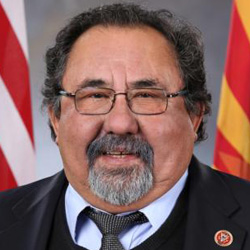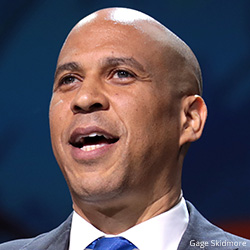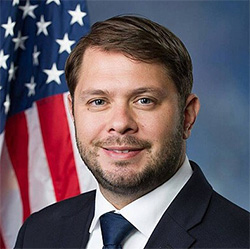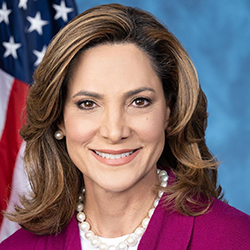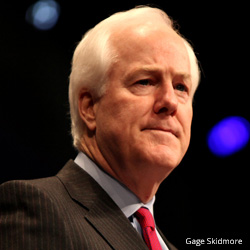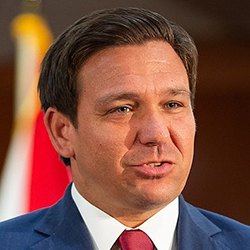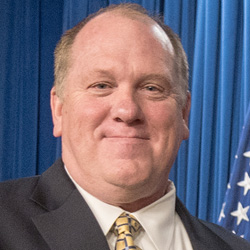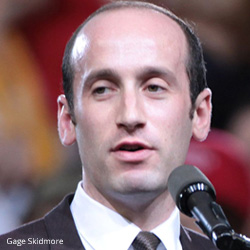Alex Padilla
Democratic U.S. Senator from California
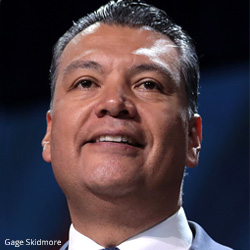
After California Gov. Gavin Newsom named Alex Padilla to fill the U.S. Senate seat vacated by Vice Pres. Kamala Harris in 2020, he was reelected to a full term in the 2022 midterms. Padilla is the first Latino to serve in the U.S. Senate from California, a state where Latinos make up 40 percent of the population, and the first Latino to chair the Senate Judiciary Committee’s Immigration subcommittee.
The son of Mexican immigrants who met while applying for green cards, Padilla was first drawn into politics in 1994 to campaign against Proposition 187. The ballot measure, which was approved by voters but never enforced, would have denied services such as healthcare and public education to undocumented immigrants. Padilla saw the measure as symptomatic of a broader anti-immigrant sentiment gaining traction at the time. “Seeing the harsh rhetoric of that campaign and the political climate around it, I realized I had no choice,” said Padilla. “I had to get involved so that families like mine, communities like mine, would not continue to be scapegoated or targeted.”
While he served as a California state senator from 2006 to 2014, Padilla quietly worked to increase access to public services for California’s undocumented population, including making undocumented students eligible for financial aid, permitting issuance of driver’s licenses to individuals without proof of citizenship or lawful status, and to prohibit law enforcement from detaining anyone solely on the basis of their immigration status.
Immigration is one of Padilla’s top priorities: In his first year as a U.S. senator, he introduced seven pieces of immigration legislation, more than all but three other senators in the 117th Congress. Through his bills, he has sought to create pathways to citizenship for veterans and their families, essential workers, and young people who entered the U.S. legally as the children of visa-holders but aged out of protected status (also known as “documented Dreamers”). He also introduced a bill that would allow any noncitizen to apply for a green card if they had resided in the U.S. continuously for more than seven years.
Padilla is willing to work with his Republican colleagues — and equally willing to go around them. He has cooperated on legislation with more moderate Republicans, including Susan Collins and Lisa Murkowski, and took part in bipartisan negotiations between fellow Democrat Dick Durbin and Republicans Thom Tillis and John Cornyn. But he was also one of the key players in a last-ditch effort to create a pathway to citizenship and recapture unused green cards through the filibuster-proof budget reconciliation process in 2021. When the Senate parliamentarian blocked the measures, saying they went too far beyond budgetary concerns, Padilla initially held the line, saying the budget would “have a hard time passing the Senate if there’s not something on immigration.” But after repeated failures to appease the parliamentarian, Padilla ultimately voted for the budget without any provisions on immigration.
He also tried to amend the Immigration and Nationality Act to disincentivize the deportation of long-term residents of the U.S.; to prevent criminal sentences that have been dismissed, vacated, or pardoned from affecting an individual’s immigration status; and to ensure people stopped for inspection while trying to enter the U.S. have access to counsel.
In 2024, Padilla vigorously campaigned against the bipartisan border bill, calling the legislation “inadequate” for its failure to address “Dreamers, farmworkers and other long-term undocumented members of our communities.” The bill was the result of bipartisan negotiation and had the strong support of Democratic Party leaders, including then-President Joe Biden and then-Vice President Kamala Harris. Meanwhile, Donald Trump reportedly told Republican senators to vote against the bill, fearing its passage would hurt him at the polls. In the heat of a presidential race where Republicans regularly polled higher than Democrats on immigration, the bill was seen as a rare opportunity for Democrats to neutralize Trump’s edge on immigration. Padilla’s opposition to the bill shows that he’s willing to buck his party, even in the heat of a presidential campaign, when it comes to immigration.
SOURCES:
- Padilla convinces colleagues to vote against bipartisan border bill Los Angeles Times — May 24, 2024
- Alex Padilla talks Senate agenda, family’s immigrant story, and ending the filibuster Fox 11 — December 23, 2020
- Alex Padilla’s full interview with CALmatters CALmatters (YouTube) — September 16, 2018
- Secretary of State Alex Padilla Statement on Trump Executive Order on Border Separations Alex Padilla, California Secretary of State — June 20, 2018
- California Secretary of State Alex Padilla Statement on Joe Arpaio Pardon Alex Padilla, California Secretary of State — August 25, 2017
- Secretary of State Alex Padilla Statement on US Supreme Court DACA Ruling Alex Padilla, California Secretary of State — June 18, 2020
- Alex Padilla’s Voting Records on Issue: Immigration VoteSmart — Accessed January 3, 2020
- California rebuffs 2nd Trump commission voter data request AP News — July 26, 2017
- Alex Padilla (Twitter) — Jul 17, 2019
- Alex Padilla (Twitter) — Dec 21, 2018
- “California New Motor Voter Act Passed by Legislature” Alex Padilla, California Secretary of State — September 11, 2015
- Padilla To Chair Senate Immigration Subcommittee Sen. Alex Padilla press release — February 14, 2021
- Sen. Alex Padilla’s first bill would offer citizenship to essential workers Sen. Alex Padilla press release — March 12, 2021
- Immigration Loss Leaves Democrats Eyeing Risky Alternatives Bloomberg Government — December 17, 2021
- Senators relaunch bipartisan immigration discussions Roll Call — April 28, 2022
- Padilla Introduces Border Patrol Accountability Legislation Sen. Alex Padilla press release — November 5, 2021
- Padilla, Menendez, Colleagues Urge for a Decrease in Funding for Immigration Enforcement and Detention Operations in FY22 Sen. Alex Padilla press release — July 6, 2021
- Padilla, Durbin Press Department of Justice to Support Immigration Judges Sen. Alex Padilla press release — May 24, 2021
- Padilla, Ross Lead 49 Colleagues in Urging DHS to Expand DACA Eligibility to Documented Dreamers Sen. Alex Padilla press release — November 30, 2021
- Padilla Introduces Legislation to Broaden Legal Pathway to Citizenship Sen. Alex Padilla press release — September 28, 2022
- Padilla Urges State Department to Address International Student Visa Backlog Sen. Alex Padilla press release — August 6, 2021
- Padilla, Colleagues Introduce Legislation to Increase Number of Green Cards and Eliminate Backlog Sen. Alex Padilla press release — March 2, 2022


